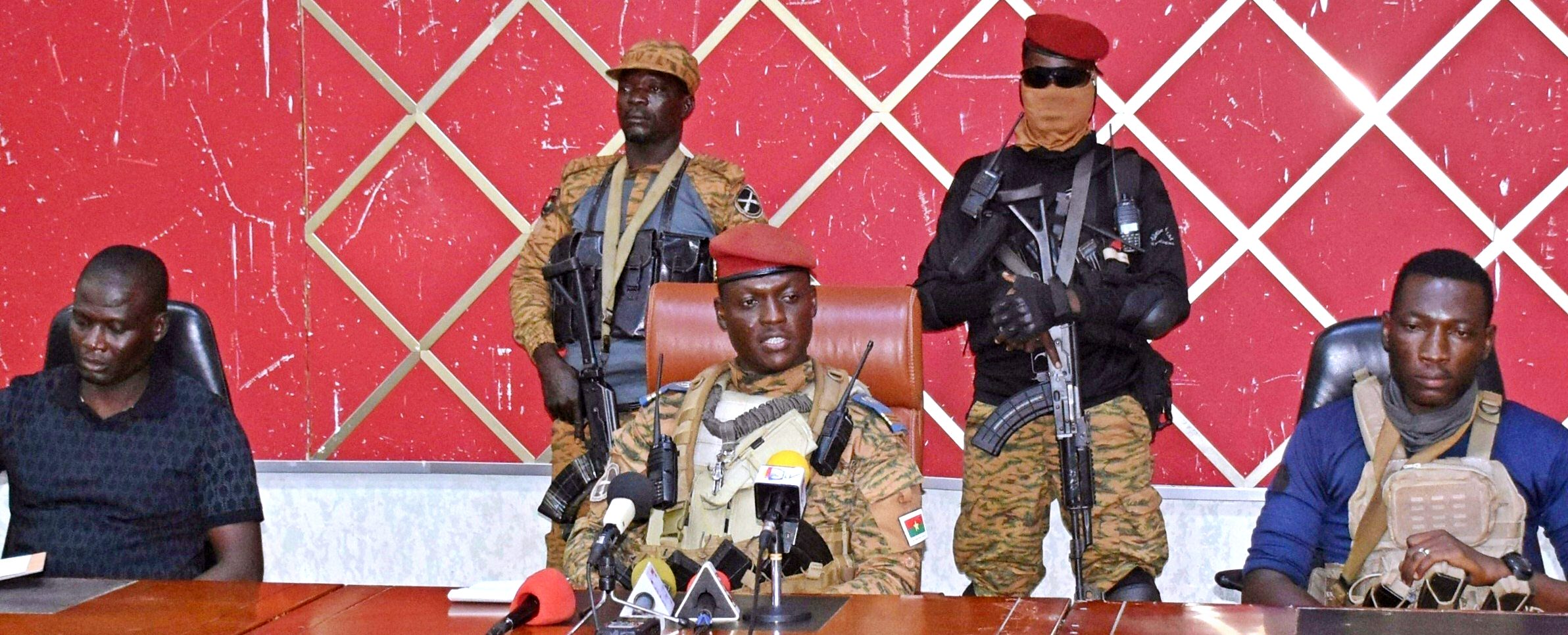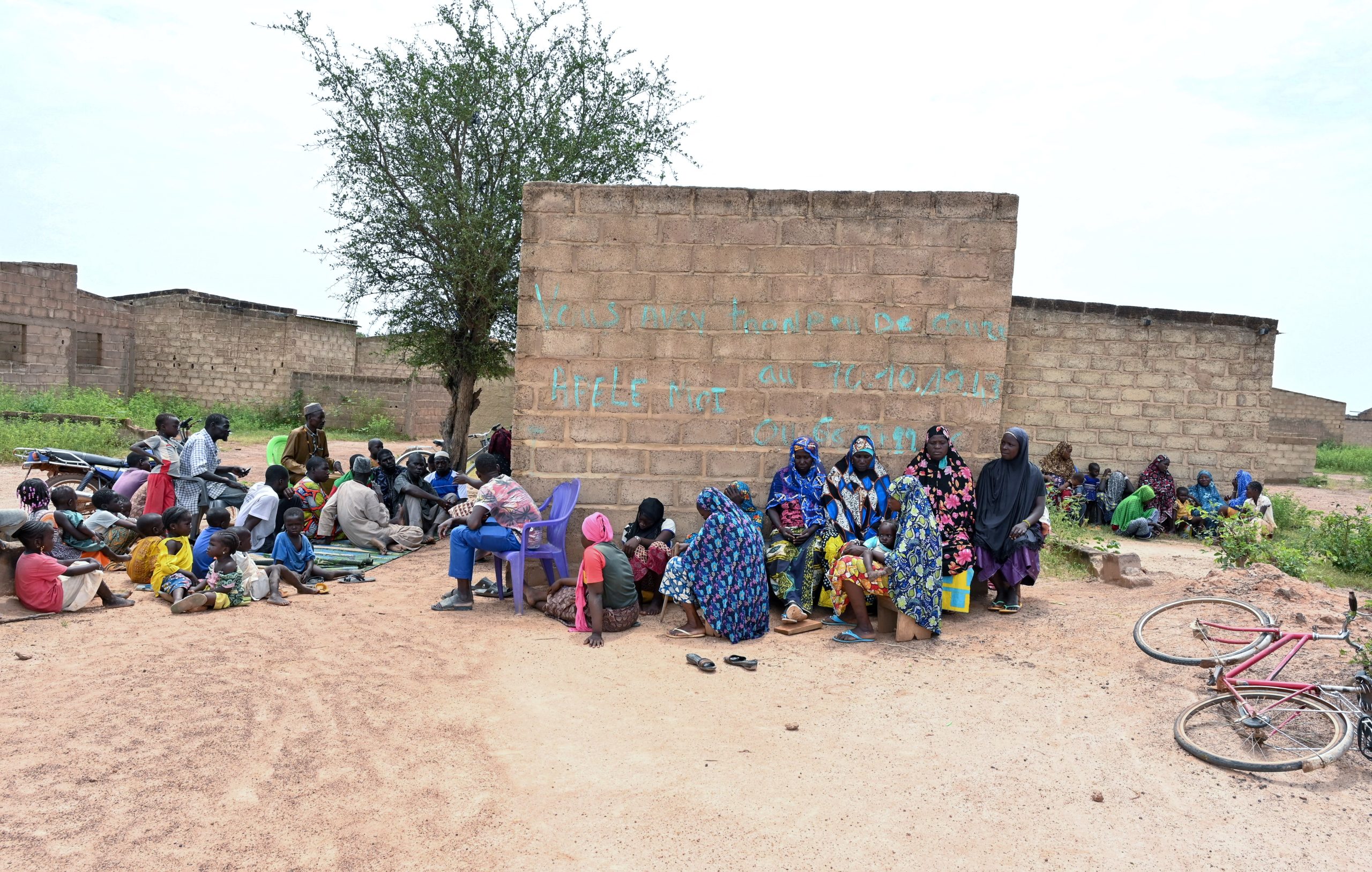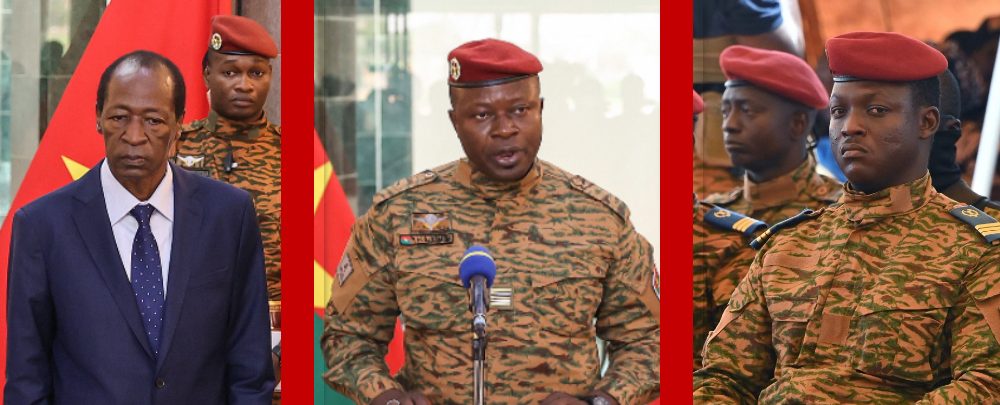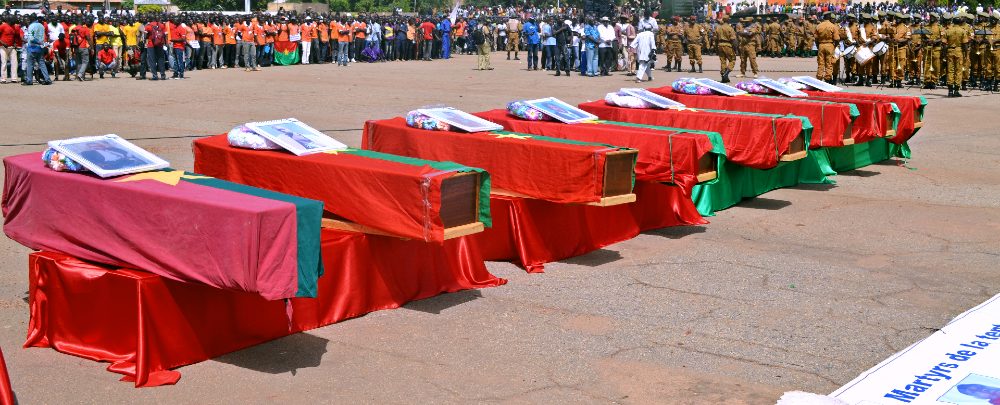English | Français

Capt. Ibrahim Traore (center) at a press conference in Ouagadougou on October 2, 2022. (Photo: AFP)
Burkina Faso suffered its second coup of the year when Captain Ibrahim Traoré, the 34-year-old head of an artillery unit of the Armed Forces of Burkina Faso, declared himself head of state on September 30. The coup ousted the previous junta leader, Lieutenant Colonel Paul-Henri Sandaogo Damiba. Traoré justified his seizure of power on Burkina Faso’s deteriorating security situation. Damiba had led an earlier coup in January 2022, similarly claiming he would address the country’s security crisis.
Traoré was a participant in the January coup and was aided in the latest putsch by several members of Damiba’s junta. In contrast, other junta members continued to side with Damiba. Most Burkinabe military officers, meanwhile, have not participated in either coup, underscoring the fragmented state of Burkina Faso’s armed forces and the highly arbitrary means by which power has changed hands.

Displaced families, who fled Jihadists’ attacks in northern and eastern Burkina Faso, in Gampela near Ouagadougou on October 6, 2022. (Photo: AFP)
What’s Changed?
- Traoré dismissed Damiba’s transitional government and legislature and suspended the constitution, placing all power in himself and his junta.
- Traoré called on senior ministry bureaucrats to keep the day-to-day operations of government functioning.
- Traoré also met with the top brass of the military for a photoshoot to publicly demonstrate their support for the new junta under his leadership.
Cultivating the Appearance of Legitimacy
Traoré’s junta hastily organized a 2-day national forum on October 14 and 15. With junta representatives dominating the proceedings, it was little surprise that Traoré was designated as the transitional president and that the junta retained significant authority in the transitional governing charter.
The new junta’s charter largely conforms to the one adopted under Damiba and abides by the stipulations set forth by ECOWAS that the transitional president cannot run for office and that elections will take place by July 2, 2024.

Traoré follows a long legacy of military actors who have taken power through a coup in Burkina Faso (left to right): Blaise Compaoré, Paul-Henri Damiba, and Ibrahim Traoré. (Photos: AFP)
The charter also outlines the size and shape of the government during the transition, exhibiting a decidedly pro-junta configuration:
- A transitional government led by a prime minister and comprising no more than 25 ministers.
- Traoré named Appolinaire Joachim Kyelem de Tambela—a jurist, professor, and TV presenter—as prime minister.
- Traoré then named a 23-member government that included three military officers and five officials who served in Damiba’s government.
- A 71-member transitional legislature to draft the electoral laws and other legal guidelines during the transitional period. This is to be composed of:
- 20 members selected by Traoré
- 16 members from the security and defense forces
- 13 members from among leaders of society not affiliated with a political movement
- 12 members from political parties (4 from the former majority, 4 from the former opposition, 2 from the unaffiliated opposition, and 2 from other parties).
- 10 members from civil society
By design, the 16 security and defense forces plus the 20 appointed by Traoré comprise a one-seat majority at 36 members. No revision of the charter is possible without Traoré’s support and a two-thirds majority vote from the transitional legislature. Given the legislative body’s top-heavy military representation, finding 47 votes for a two-thirds majority should not prove too challenging. Until the members of the transitional legislature are named and the legislative session opened, Traoré legislates by decree.
Calls for a Return to Civilian Rule
“The role of the army in a democracy is to ensure the defense of the territory, the protection of institutions, and an unconditional submission to the legitimate civilian political authority.”
The Centre pour la gouvernance démocratique (CGD), a respected Ouagadougou-based think tank, convened a working group of Burkinabe thought leaders that offered an alternative way forward. It called for a civilian-led transition, stating that:
- The constitution is supreme over any other legal provision whatever the exceptional circumstances, including a coup d’état.
- The role of the army in a democracy is to ensure the defense of the territory, the protection of institutions, and an unconditional submission to the legitimate civilian political authority.
- Instead of Traoré becoming transitional president, citizens should insist that the military return to the barracks.
Implications for the Way Forward
Traoré’s actions since taking power reveal little strategic planning beyond installing himself as president and further entrenching military rule in a country that is still emerging from the 27-year military-turned-authoritarian government of Blaise Compaoré, which was finally forced from power in 2014.
Traoré justified his coup by claiming he would restore security and turn the tide of conflict. Yet the effects of the coup have reportedly diverted precious resources, attention, and personnel from the frontlines of the security and humanitarian crises confronting the country. This includes more than 1,500 violent events and 3,800 fatalities projected in 2022. This violence has forcibly displaced roughly 2 million people out of a population of some 22 million. Violent events are on pace to increase by 35 percent this year—when the first coup took place.

Victims of the 2015 coup in Burkina Faso. (Photo: AFP)
The coup also resulted in the suspension of ongoing major military operations in some of the worst affected zones, including the north central, tri-border, eastern, and western zones.
While the junta has gone to great lengths to characterize its seizure of power as popular and used the national forum to provide the appearance of support, it is effectively ruling by decree. Rather than being representative of the population, those participating in the transitional government serve only Traoré and the junta. The absence of a constitutional framework, oversight of the military, or strategic direction for addressing the country’s security threats suggests Burkina Faso’s instability is likely to persist.
Additional Resources
- Africa Center for Strategic Studies, “Five Zones of Militant Islamist Violence in the Sahel,” Infographic, September 26, 2022.
- Africa Center for Strategic Studies, “Mali’s Militant Islamist Insurgency at Bamako’s Doorstep,” Infographic, August 29, 2022.
- Michael Shurkin, “Strengthening Sahelian Counterinsurgency Strategy,” Africa Security Brief No. 41, Africa Center for Strategic Studies, August 2022.
- Africa Center for Strategic Studies, “Debunking the Malian Junta’s Claims,” Infographic, April 12, 2022.
- Joseph Siegle, “Africa’s Coups and the Role of External Actors,” Spotlight, Africa Center for Strategic Studies, December 17, 2021.
- Africa Center for Strategic Studies, “Autocracy and Instability in Africa,” Infographic, March 9, 2021.
- Joseph Siegle and Daniel Eizenga, “Attention au coup populaire,” Éclairage, Centre d’études stratégiques de l’Afrique, 1 septembre 2020.

